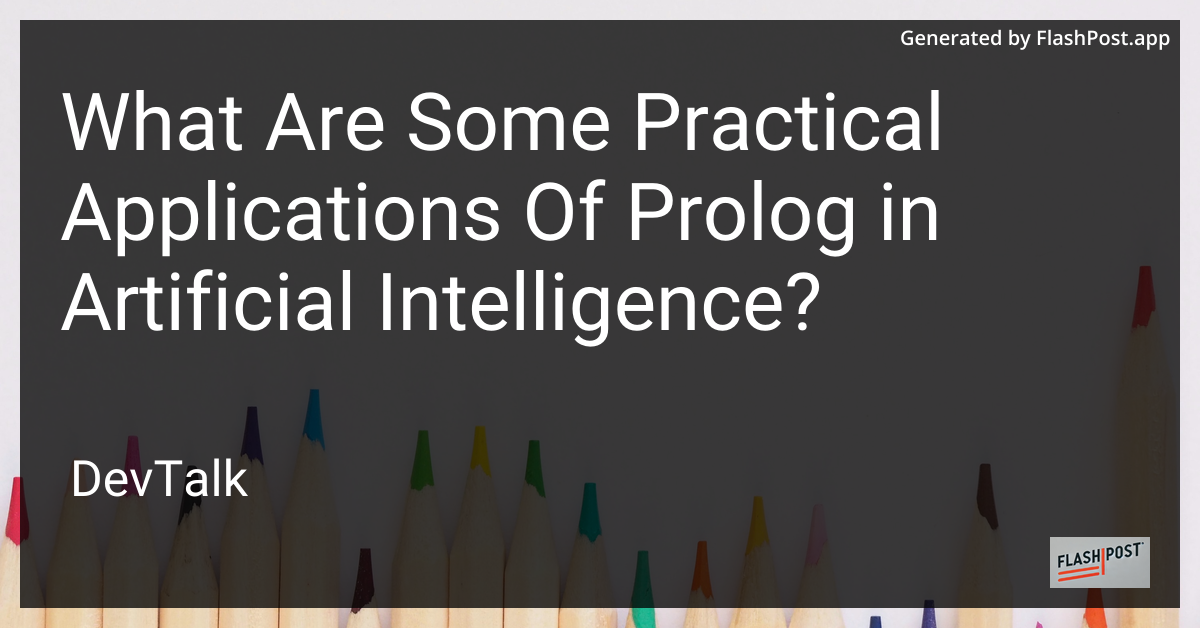What Are Some Practical Applications Of Prolog in Artificial Intelligence?

Practical Applications of Prolog in Artificial Intelligence
Prolog, a logic programming language, has been a strong player in the field of Artificial Intelligence (AI) since its inception.
Known for its powerful pattern-matching capabilities, non-deterministic approaches, and rich support for symbolic reasoning, Prolog offers numerous practical applications in AI. In this article, we explore some of these applications, highlighting how Prolog remains relevant and innovative in the evolving landscape of AI technology.
1. Natural Language Processing (NLP)
Natural Language Processing is one of the most significant applications of Prolog. The language's pattern matching and symbolic reasoning capabilities make it ideal for parsing and understanding human languages. Prolog can be used to build grammars for language interpretation, develop chatbots, and enhance sentiment analysis frameworks. Its ability to infer meanings from sentences through logical constructs enables developers to create sophisticated NLP models effectively.
2. Expert Systems
Expert systems, which mimic the decision-making ability of a human expert, represent another domain where Prolog shines. These systems rely heavily on the rules-based logic that Prolog excels in. By encoding expert knowledge into Prolog rules, systems can derive new knowledge and make informed decisions. Industries such as healthcare use Prolog to develop diagnostic tools that suggest treatments based on symptoms and historical data.
3. Constraint Solving
Prolog’s inherent ability to handle constraints allows it to solve complex problems efficiently. This is particularly useful in areas such as scheduling, resource allocation, and optimization problems. Prolog's constraint logic programming (CLP) extends its capabilities, providing a powerful framework for solving real-world problems where multiple constraints need to be satisfied simultaneously.
4. Knowledge Representation
In AI, representing and managing vast amounts of information is crucial. Prolog provides a robust framework for knowledge representation, thanks to its declarative nature. Systems can represent facts, rules, and relationships effectively using Prolog, enabling efficient storage and retrieval of information. This feature makes Prolog an excellent choice for developing databases that require complex queries and reasoning over stored data.
5. Game AI
Prolog’s non-deterministic features allow it to explore multiple possibilities simultaneously, making it a suitable candidate for developing AI in games. Prolog can be used to create game strategies, simulate different game scenarios, and automate decision-making processes. Its capability to backtrack and explore different game paths enhances its utility in developing sophisticated game AI models.
6. Automated Reasoning
Automated reasoning is a field focused on the development of systems that reason automatically to solve problems. Prolog's logical inference engine is ideally suited for tasks that involve theorem proving, verifying software correctness, and formalizing mathematical proofs. Automated reasoning in Prolog helps in building systems that require high levels of logical precision and accuracy.
Conclusion
Prolog continues to offer a wide range of applications in the AI space due to its unique strengths in logical reasoning and pattern matching. From NLP and expert systems to game AI and automated reasoning, Prolog's utility is vast and varied. For those interested in exploring Prolog programming and its logical principles, resources such as Prolog Logic Checker, Prolog Logical Implication, and Prolog Logical Operators provide valuable insights into this fascinating language. Additional guides on Prolog Logic Programming are also available for those interested in diving deeper into Prolog's capabilities.
Prolog remains a compelling choice for developing AI applications, proving that its strengths in logic and reasoning can tackle today's complex AI challenges effectively.